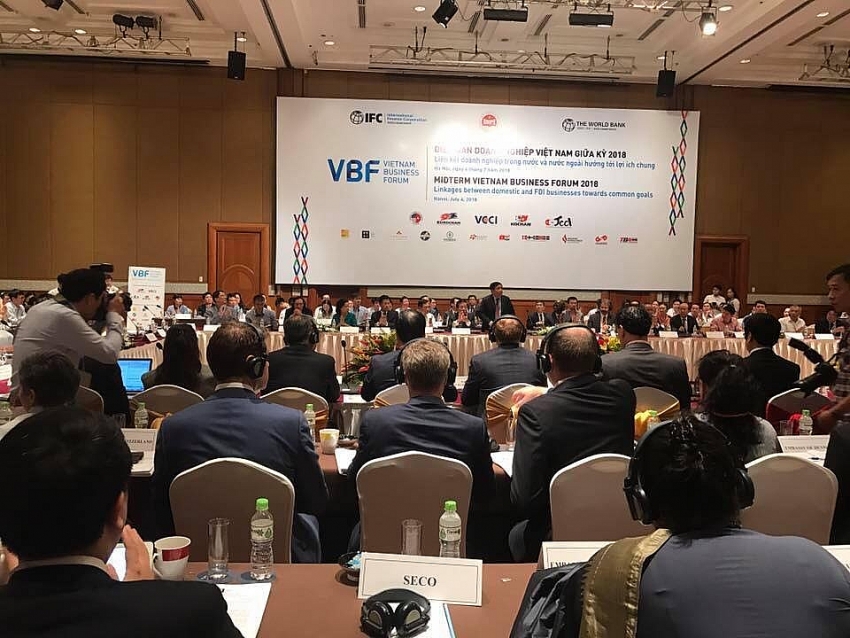VBF: improving linkages between domestic and foreign businesses
 |
| The mid-term VBF taking place on July 4 |
The mid-term Vietnam Business Forum (VBF) 2018 has taken place in Hanoi under the co-chairmanship of Minister of Planning and Investment Nguyen Chi Dung, senior country manager of International Finance Corporation (IFC) Kyle F. Kelhofer, and VBF Consortium's co-chair Tomaso Andreatta.
Around a thousand representatives from ministries, agencies, diplomatic agencies, and international organisations, as well as business associations and foreign-invested enterprises attended the event.
Vietnam is going to celebrate 30 years of attracting foreign dirrect investment (FDI) to highlight the achievements of its socioeconomic development, after which it will issue numerous policies based on the recommendations of domestic and foreign businesses in order to form a transparent and favourable investment climate.
Minister of the Planning and Investment Nguyen Chi Dung appreciated that the foreign-invested enterprises (FIE) have been developing to become an important economic sectors, contributing to Vietnam’s socioeconomic development. There are 128 nations and territories investing in Vietnam with more than 6,000 FDI projects worth $326 billion of total registered capital and over $180 billion of disbursed capital.
The FDI sector has increasingly confirmed its role in the Vietnamese economy, contributing 25 per cent to total social investment, and 20 per cent to the GDP. 58 per cent of the total FDI capital went into the processing and manufacturing industry, contributing 72.6 per cent of the total export value, creating 3.6 million direct jobs, and 5-6 million indirect jobs.
The FDI sector has created spillover effects to other fields of the economy. However, linkages between FIEs and the domestic sector are still weak, while the development of the supporting industry and technology transfer are at low levels.
In order to strengthen the linkages, Minister Dung asked FIEs to further facilitate Vietnamese firms to take part in value chain, while domestic firms should do their utmost to innovate management practices towards reaching out to cutting-edge technology, improving skills and knowledge of employees, as well as improving productivity, quality, and competitiveness.
Related to these issues, Tomaso Andreatta, co-chairman of VBF Consortium, assessed that domestic enterprises are often too small and lack know-how and knowledge to sell their products to global companies and have to procedure top-quality products at a reasonable price. This is why they still have to ask suppliers to come to Vietnam and bring local companies up to speed.
“Vietnamese companies need international-level management, middle management, training schools, service companies, banks, insurance, and technology, many of which are not easy to bring in due to regulatory barriers or because foreign investors have serious concerns. First of all, there are concerns over IP protection, dispute resolution, or more recently, the expected consequences of the new internet law,” Andreatta stated.
“Another limitation of Vietnam in attracting higher technology is that, despite its large population, the monetary size of the market for most products, whether consumer or industrial, is limited, and Vietnamese people buy mostly goods made in Asia. Issues with customs and taxes that cost money, time, and energy, many companies produce in Vietnam to re-export 100 per cent of their goods, which isolates domestic companies from FIEs.”
Vu Tien Loc, chairman of the Vietnam Chamber of Commerce and Industry (VCCI), emphasised the importance of incentive policies and improving the business climate, which the Vietnamese government could carry out to improve efficiency, especially in export and import, as well as create new opportunities on trade and investment.
VCCI also proposed facilitating enterprises to export through free trade agreements, and approve the CPTPP as soon as possible so that Vietnam can take advantage at the soonest.
What the stars mean:
★ Poor ★ ★ Promising ★★★ Good ★★★★ Very good ★★★★★ Exceptional
Related Contents
Latest News
More News
- Foreign leaders extend congratulations to Party General Secretary To Lam (January 25, 2026 | 10:01)
- 14th National Party Congress wraps up with success (January 25, 2026 | 09:49)
- Congratulations from VFF Central Committee's int’l partners to 14th National Party Congress (January 25, 2026 | 09:46)
- 14th Party Central Committee unanimously elects To Lam as General Secretary (January 23, 2026 | 16:22)
- Worldwide congratulations underscore confidence in Vietnam’s 14th Party Congress (January 23, 2026 | 09:02)
- Political parties, organisations, int’l friends send congratulations to 14th National Party Congress (January 22, 2026 | 09:33)
- Press release on second working day of 14th National Party Congress (January 22, 2026 | 09:19)
- 14th National Party Congress: Japanese media highlight Vietnam’s growth targets (January 21, 2026 | 09:46)
- 14th National Party Congress: Driving force for Vietnam to continue renewal, innovation, breakthroughs (January 21, 2026 | 09:42)
- Vietnam remains spiritual support for progressive forces: Colombian party leader (January 21, 2026 | 08:00)

 Tag:
Tag:

























 Mobile Version
Mobile Version